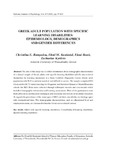| dc.contributor.author | Bampalou, Christina Ε. | |
| dc.contributor.author | Kouimtzi, Eleni M. | |
| dc.contributor.author | Bonti, Eleni | |
| dc.contributor.author | Kyritsis, Zacharias | |
| dc.date.accessioned | 2022-01-29T10:41:33Z | |
| dc.date.available | 2022-01-29T10:41:33Z | |
| dc.date.issued | 2020 | |
| dc.identifier.uri | http://hdl.handle.net/11728/12138 | |
| dc.description.abstract | : The aim of this study was to collect information about demographic characteristics
of a clinical sample of Greek adults with specific learning disabilities (SLD) who referred
themselves for learning assessment in a State Certified Diagnostic Center. Greek adult
population with SLD is under-researched and difficult to access. The sample comprised 132
Greek adults (66.7% males) meeting the Diagnostic and Statistical Manual of Mental Disorders
criteria for SLD. Data were collected through self-report records and case records which
included demographic information and learning assessments. Most of the participants came
from urban areas and they were studying in post-secondary non-tertiary or in tertiary education.
As regards the prevalence of the main types of SLD and their comorbidity our findings agree
with international data. The demographic characteristics, such as educational level and
employment status, are discussed within the Greek socio-cultural context. | en_UK |
| dc.language.iso | en | en_UK |
| dc.relation.ispartofseries | Hellenic Journal of Psychology;Vol.17 | |
| dc.rights.uri | http://creativecommons.org/licenses/by-nc-nd/4.0/ | en_UK |
| dc.subject | Adults with specific learning disabilities | en_UK |
| dc.subject | Comorbidity of learning disabilities | en_UK |
| dc.subject | Specific learning disabilities | en_UK |
| dc.title | Greek Adult Population with Specific Learning Disabilities: Epidemiology, Demographics and Gender Differences | en_UK |
| dc.type | Article | en_UK |


